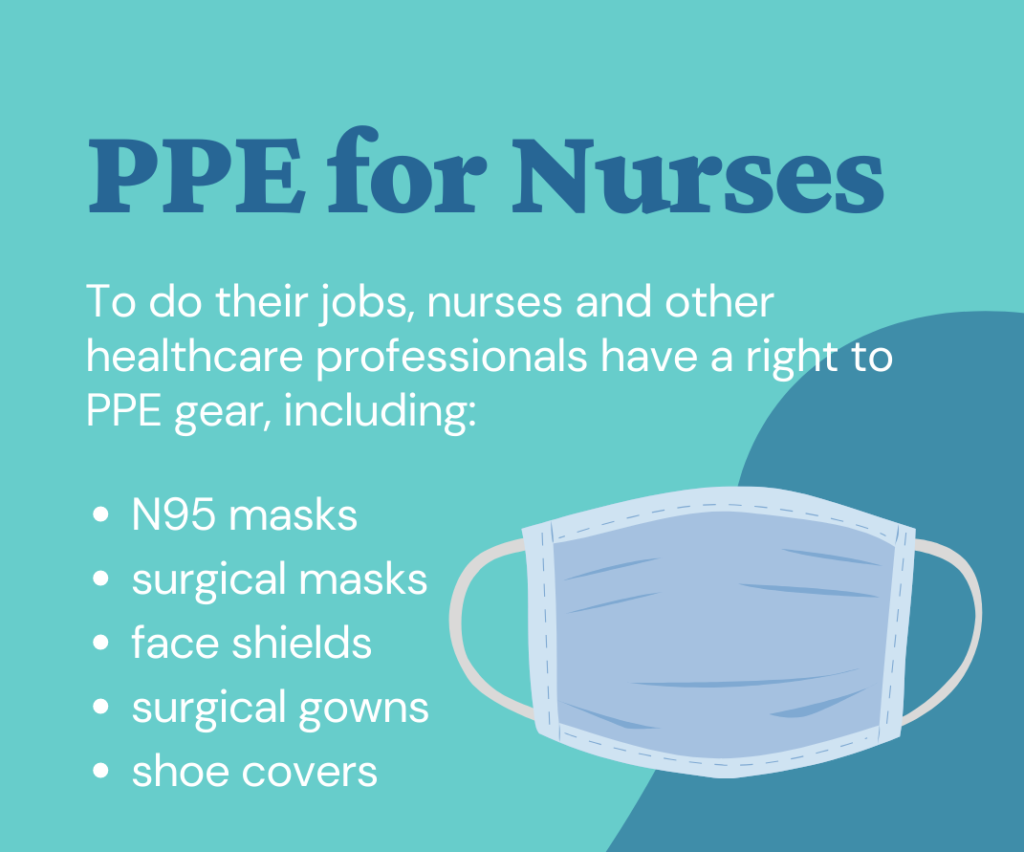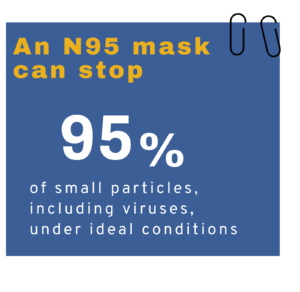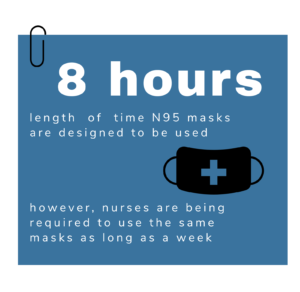PPE nursing precautions include protective masks for nurses as well as government action to prevent hoarding and price gouging. In these uncertain times, people around the world are filled with gratitude for people who are putting their lives on the line, day in and day out, caring for people who have been affected by the coronavirus.
One of the biggest issues facing the professional medical community is the lack of personal protective equipment, or PPE, available. The PPE shortage has affected all areas of healthcare, from emergency medicine to nursing homes. Let’s take a look at some of the most frequently asked questions about the PPE shortage and how it’s affecting medical professionals.
What Type of PPE for Nurses is Needed for the COVID-19 Crisis?
Featured Programs
The mask that best protects medical professionals from coronavirus is called an N95 mask, also known as an N95 respirator. These makes are nearly impossible to come by, even for doctors, nurses, and other medical professionals who are working around the clock to provide direct patient care.

These masks fit extremely close to the face and provide the best possible protection from the coronavirus. These masks are essential for those who work in close contact with patients. Standard surgical masks and other face coverings do not protect doctors and nurses from the coronavirus nearly as well as an N95 mask.
While the N95 mask does not guarantee protection against the virus, it offers a much higher level of protection than other face coverings. When fitted properly, an N95 mask prevents 95% of very small test particles from getting through to the wearer. An N95 mask both protects the wearer against disease particles expelled by patients and the patients against disease particles expelled by the wearer.
Surgical masks are the next best thing for hospital professionals who cannot get N95 masks, but they are not nearly as effective as N95 masks. However, surgical masks do not form a seal around the face and are mainly used to protect patients against particles expelled by medical professionals. Also, they do little to protect the wearer from inhaling particles expelled by patients.
Why is there a Shortage of PPE for Coronavirus for Nurses and Other Medical Staff?
There are several reasons why there is a shortage of PPE for nursing homes, hospitals, and other healthcare facilities. As the coronavirus pandemic began to take hold, many people began trying to get their hands on as many N95 masks and surgical masks as possible. This meant that people were buying from bulk suppliers, and the masks were bought out faster than they could be produced. In addition to this panic-buying, hospitals began going through their supplies faster than normal due to an influx of COVID-19 patients. These two factors combined led to a shortage of masks.

While many well-meaning professionals are working to provide homemade cloth masks for medical professionals, these masks are not nearly as effective at protecting people as medical-grade masks. While something is better than nothing, doctors, nurses, and other medical professionals are risking their lives daily by working with potential coronavirus patients without access to PPE. It’s essential that masks be left for the medical professionals who need them. People who are protecting themselves from the coronavirus in public by wearing masks do not need the protection that an N95 mask provides.
What are the Ethical Considerations of the PPE Shortage?
Doctors, nurses, and other medical professionals are being forced to make hard decisions about whether they value their own health and wellbeing or patient care every day. Many doctors and nurses are asked to work without the protection they need to stay safe from the coronavirus. In some cases, nurses are having to choose between staying on the job or being suspended for refusing to work without the proper equipment they need to stay safe.
EMTs, or emergency medical technicians, and nurses, are two of the groups most affected by the shortage. These two groups spend the majority of their time directly interacting with patients. While protecting themselves is a top priority, these groups are also most likely to carry and transmit the disease to vulnerable populations. Since the coronavirus has an incubation period of up to two weeks, it’s possible for people providing direct patient care to spread the virus without knowing that they’re doing so.
Medical professionals have many ethical considerations to make when it comes to deciding whether to work. They may be saving lives by providing patient care, but they may be harming people (and themselves) by working without PPE. Hospital administrators are also at the forefront of ethical decision making in medical communities at this time, as they must decide what they require from their doctors and nurses when it comes to providing patient care with the equipment they have available.
Can PPE Equipment be Reused?
Each time PPE equipment is reused, its effectiveness is lowered. It’s impossible to reuse PPE and have it be as effective as the first time it was used. When PPE is worn, it picks up airborne particles, as well as fluid particles expelled by patients. It’s nearly impossible for medical professionals to take off the mask in a way that doesn’t require them to touch the inside of the mask. The moment a medical professional touches the inside of the mask, there is a risk of contamination from their hands.

Reused PPE is better than no PPE, but medical professionals are exposing themselves to significant, increasing risks each time they need to reuse their PPE. Use advisories have changed due to the PPE shortage. PPE nursing precautions now allow nurses to reuse their PPE, as long as they follow certain guidelines. For N95 masks, it’s recommended that the mask be worn for no longer than 8 hours, and be stored in a clean, dry, breathable paper bag or another container when it’s not in use. With surgical masks, it’s recommended that the mask continue to be worn until it is visibly soiled or moist. Furthermore, the mask should be carefully folded before storing it. You want the outside (patient-facing) part of the mask so it does not touch the inside (provider-facing) side of the mask. Additionally, the mask should then be placed in a breathable container or plastic bag.
What Actions are Being Taken Against People Who are Price-Gouging PPE Equipment?
Many people have taken to Amazon, eBay, and other online retailers to sell PPE at an increased price. While this is illegal, several sellers have reaped the benefits of providing the equipment to medical professionals (and non-professionals) who are willing to pay a high price for their peace of mind. The government has begun to take action, arresting people who are engaging in these practices and seizing the equipment they’re selling.
This equipment is being redistributed to medical professionals. While this is helpful, it can be impossible to tell whether the equipment they’ve used has been tampered with in any way, making it a less effective choice than PPE masks and other supplies that come directly from trusted medical suppliers.
What Role Can the Public Play in Helping to Secure PPE for Nursing?
The most important thing that the public can do to help medical professionals through this difficult time is by leaving the medical equipment for them. Buying up unnecessary medical equipment does nothing to protect the general public, and leaves the people in charge of providing direct patient care vulnerable.
While some people think that they’re keeping their families safe by acquiring N95 masks, it’s key to think about what would happen if a family member actually needed to go to the hospital, and had to be treated by a medical professional who did not have proper PPE. The hospital quickly becomes an unsafe, unsanitary environment, and leaves both workers and patients susceptible to many diseases, not just the coronavirus.
For people who have already acquired N95 and surgical masks and have realized that they’re in the wrong, donating these items to a local hospital, nursing home, or other healthcare facility is the right thing to do. Doctors and nurses will be able to safely work due to these donations. If you want to donate supplies but you’re not sure where to start, call your local hospital and ask how you can most effectively donate your items.
How are Nurses Advocating for Themselves During the Coronavirus and PPE Shortage?
There’s no easy way to put it: nurses on the front lines of the coronavirus are struggling. They’re working to limit the amount of time they spend with patients, and they’re working to reuse their PPE as safely as possible. Some hospitals are requiring that nurses reuse their PPE equipment three times. The hospital then cleans the equipment and returns it to the nurse. While this is better than nothing, it’s not nearly as effective a method of protection as new PPE.
Many nurses are taking part in fighting back. Some nurses are refusing to work with COVID-19 positive patients unless they’re given proper protective gear. Some hospitals are reassigning these nurses to other floors for the duration of their shifts, while other hospitals are firing nurses who refuse to work without PPE. It’s essential that nurses come together to fight for one another during this time, but many are having to make the hard decision between caring for their patients and caring for themselves.
Nursing and COVID-19 Resources: